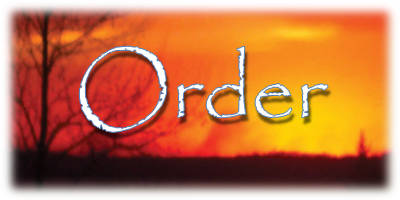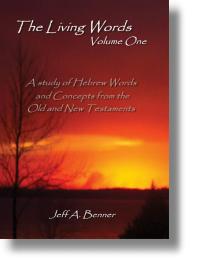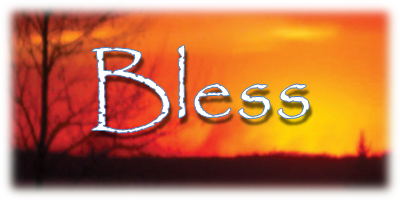Topics  The Living Words The Living Words 

The Living Words: Order
This article is an xcerpt from Mr. Benner's book The Living Words.
The parent root דר dar does not appear in the Biblical text, but by examining other words derived from this root, we discover that it has the meaning of "order."
| The land dark as midnight, The land of the shadow of death, without any order (seder), And where the light is as midnight Job 10:22 |
This is the only Biblical occurrence of the word סדר seder [H:5468], but nouns derived from this verb are used in the Hebrew language today. The Passover service and meal is called a seder, an ordered arrangement. Also, the word sidur, the Jewish prayer book, is composed of an ordered arrangement of prayers.
| All these being men of war, that could order (eder) the battle array... 1 Chronicles 12:38 (ASV) |
Here the word עדר eder [H:5737] is used for the order of a battle arrangement.
In a previous discussion, we looked at the root דבר davar [H:1696] and the words derived from it, all having the concept of order behind them.
| Thy name, O LORD, endureth for ever; and thy memorial, O LORD, throughout all generations (dor). Psalm 135:13 (KJV) |
Another word derived from the parent דר dar is the Hebrew word דור dor [H:1755], usually translated as "generation."
From a western view, a generation is the time from the birth of one man to the birth of his children. We perceive each generation as a linear timeline, with a beginning and an end. The Hebrew mind, however, sees time as circular where each generation is one circle of time and each of the following generations are overlapping circles, like a spring seen on edge. There is no beginning and no end. This circular view of time is perceived as order.
The phrase "all generations," found in the verse above, is ודר לדר le'dor vador in Hebrew and is literally translated as "to a generation and a generation, a Hebraic idiom meaning "time after time."
In the ancient pictographic script, the root דר dar is written as   . The . The  is a picture of a tent door (The name of the letter is a picture of a tent door (The name of the letter  is dalet and is derived from the word דלת delet [H:1817] meaning a door.) and has the meaning of an "in and out" or "back and forth" movement. The is dalet and is derived from the word דלת delet [H:1817] meaning a door.) and has the meaning of an "in and out" or "back and forth" movement. The  is the head of a man (The name of the letter is the head of a man (The name of the letter  is resh and is derived from the word ראש rosh [H:7218] meaning a head of a man.). When combined, these mean "the movement of man" and is very descriptive of a generation from a Hebraic perspective as the movement through the circle of one man's life. The next generation is the movement of his son's life through the following circle. is resh and is derived from the word ראש rosh [H:7218] meaning a head of a man.). When combined, these mean "the movement of man" and is very descriptive of a generation from a Hebraic perspective as the movement through the circle of one man's life. The next generation is the movement of his son's life through the following circle.
 |
|
|
Related Pages by Jeff A. Benner
 | | The Living Words (Book)
A study of Hebrew words in the Old and New Testament from their original Hebraic perspective. |
 | | The Living Words: Bless (Article)
Excerpt from Mr. Benner's Book "The Living Words" and examining the Hebrew word for bless. |
|






